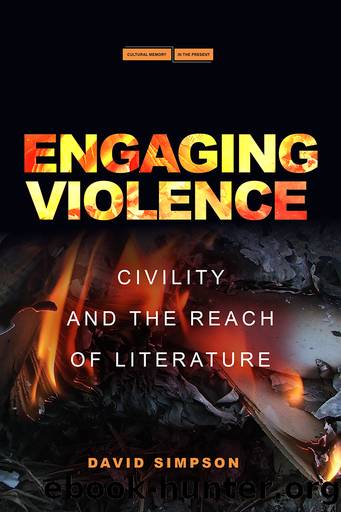Engaging Violence by Simpson David;

Author:Simpson, David;
Language: eng
Format: epub
Publisher: Stanford University Press
Published: 2022-06-15T00:00:00+00:00
The case of India is very different. Here, the sheer numbers of those being governed, the size of the subcontinent and its distance from the motherland, along with the continual physical violence of exploitation and repression, made for much more anxious efforts at developing coping mechanisms for keeping the masses in a peaceably huddled condition. Gauri Viswanathan has given us a detailed account of attempts at managing British India through the teaching of literature. The 1813 Charter Act established British responsibility for educating its subjects, and from 1835 that education stipulated a study of English literature, almost forty years before the British domestic school system (in 1872) took the same step.59 The Indian sphere raised questions not encountered in Britain: debates between anglicists and orientalists, arguments for and against Christianization and decisions about how to interact with Indiaâs own diverse faiths. Macaulayâs 1835 âMinute on Indian Educationâ has become notorious for its dismissal of the value of printing and circulating items of native culture, but there had also been a countervailing, positive estimate of Indian literature and philosophy in the work of Sir William Jones from the 1780s on. Viswanathan suggests that while a good deal of Christian doctrine could be smuggled in along with the teaching of literature without resorting to any formal theology, the full potential of Bildung, with its commitment to autonomous self-development, could not be offered to the natives without becoming a source of subversion and discontent. Encouraging Indians to imbibe British culture without offering them tangible rewards was a risk, one further enhanced by the inevitable racism directed by the colonizers at the colonized.60 Thus, it is argued, Indiaâs version of âthe Western literary canon evolved out of a position of vulnerability, not of strengthâ (p. 168).
There are no novels in this canon; poetry, drama, history and belles lettres dominate the curricula, with Romantic writers figuring in the missionary lists, and eighteenth-century writers in those of the government schools.61 So too the Arnoldian paradigm imagined for domestic use ignores the British novel that had been visibly flourishing for over a hundred years. The novel is apparently imagined more as entertainment for the common reader than as a sophisticated genre requiring learned skills and vocabularies for its appreciation. It is also prone to going beyond the cultivation of a merely contemplative reading subject in its representation of a range of social, educational and economic types. It is thereby more likely to have to register incidences of violence, even when they are finessed. Arnoldian culture (as Bildung) was conceived along Schillerian lines as an antidote to violence, which meant that it had to remain very selective about what kinds of literature it could sponsor, as well as staying away from the more disturbing possibilities opened up in the inevitable modern compulsion to âthe dialogue of the mind with itself,â the possibilities opened up by theory, Romantic irony and (eventually) psychoanalysis.62 Literature specifically, as long as it is the best, offers to heal or avoid the tendency for religion to lapse into divisiveness and dogma.
Download
This site does not store any files on its server. We only index and link to content provided by other sites. Please contact the content providers to delete copyright contents if any and email us, we'll remove relevant links or contents immediately.
The Power of Myth by Joseph Campbell & Bill Moyers(1068)
Half Moon Bay by Jonathan Kellerman & Jesse Kellerman(987)
A Social History of the Media by Peter Burke & Peter Burke(987)
Inseparable by Emma Donoghue(983)
The Nets of Modernism: Henry James, Virginia Woolf, James Joyce, and Sigmund Freud by Maud Ellmann(913)
The Spike by Mark Humphries;(812)
The Complete Correspondence 1928-1940 by Theodor W. Adorno & Walter Benjamin(788)
A Theory of Narrative Drawing by Simon Grennan(782)
Culture by Terry Eagleton(776)
Ideology by Eagleton Terry;(743)
World Philology by(719)
Farnsworth's Classical English Rhetoric by Ward Farnsworth(715)
Game of Thrones and Philosophy by William Irwin(712)
Bodies from the Library 3 by Tony Medawar(709)
High Albania by M. Edith Durham(705)
Adam Smith by Jonathan Conlin(695)
A Reader’s Companion to J. D. Salinger’s The Catcher in the Rye by Peter Beidler(688)
Monkey King by Wu Cheng'en(654)
Comic Genius: Portraits of Funny People by(652)
